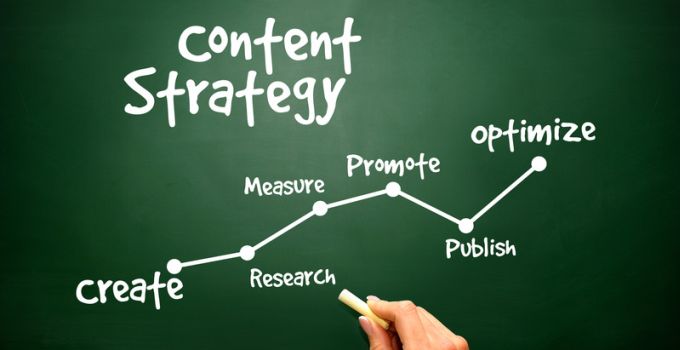There are over 1 billion websites online today. If your website doesn’t have the momentum it needs, it will get lost in all that noise and not be effective for your business. In the sixth and final article of this series, I will talk about the importance of promoting your website to get momentum going.

6 Reasons Series: #3 Lack of Focus
4.
6 Reasons Series: #3 Lack of Focus
6 Reasons Your Website is Ineffective (Continued): Reason #3
Does your website have ADHD? To be more specific, does it wander off task and have difficulty sustaining focus? If it does, then you most likely experience issues attracting visitors and making sales. Fact is, the less focused your website is, the less effective it will be. In part 3 of this series, I will show you ways to make your website more focused and consistent.
Evaluating your website's current focus level
Here are a few questions you can ask yourself when evaluating your website’s current focus.

- Does your website, as a whole, look and feel consistent?
- Is the site consistent with your branding?
- Can visitors tell right away what you provide and who you provide it for?
- Does it target a specific market? And,
- Do each of your web pages have a unique focus of their own or are your pages filled with disjointed content?
Let’s kick things off by taking a look at why all this matters.
How focus affects your website's effectiveness
The following are a few important benefits quality content will bring to your website:
- How well & where your web pages rank in Search Engine Results Pages (SERPs). We all know that it is important that potential customers find you when they search. This is especially true if you offer products or services people search for on the go. Sites listed on the first page of results get over 70% of the clicks!
- How effective your website will be at accomplishing its mission. A focused website has a much better chance of meeting its intended purpose. That purpose can be anything from online sales to taking donations. Websites that try to do too much, or too little, just don’t work.
Focus and SEO (search engine optimization)
SEO is not the only component of focus I will discuss. But, I can’t discus focus without addressing it at some level. This is not an article on how to perform technical SEO. But, think of this as a lesson on practical SEO. Just the stuff you need to know so you understand how it affects your website. Okay, here are the basics.
Google doesn't rank websites, it ranks web pages
It is a common misconception that Google ranks websites. Ranking has to do with where Google decides to place your web page, not web site, in results pages. Companies like Moz calculate domain authority to estimate the strength of your website against other sites. Your domain is what people type in a browser to get to your website (e.g. mycompany.com). I want our focus to be on your web pages. They are the element you have most control over as far as effectiveness goes.
Keywords, density, and SERPs, oh my!
 Keywords are words (or phrases) that describe the content of a web page (para. technopedia.com). These are the terms you type in to a search engine to find content on the web. To do this, search engines need to know what your web pages are about. So, they use an algorithm that examines the content of each page. It then looks for keywords that are repeated and any related words to decide what your content is about. Search engines then return your page in search results if your keywords match part of a search query.
Keywords are words (or phrases) that describe the content of a web page (para. technopedia.com). These are the terms you type in to a search engine to find content on the web. To do this, search engines need to know what your web pages are about. So, they use an algorithm that examines the content of each page. It then looks for keywords that are repeated and any related words to decide what your content is about. Search engines then return your page in search results if your keywords match part of a search query.
Keyword density. The number of times your keyword(s) appear on your web page. Related words and phrases are part of the consideration as well.
SERP’s (Search Engine Results Pages). These are the listings that you get back after you enter a search term or phrase. There are many parts to a SERP (maps, ad’s, local business listing, etc.). The part I want to focus on is the organic search results.
Now that you know the basics of SEO, we can move on the problems a lack of focus can cause.
Problems with a lack of focus
As I mentioned earlier, good focus helps two things. It helps gets traffic to your website. And, it encourages visitors to respond to a marketing message once on your site (conversions, taking action).
But, let’s take a closer look at why a lack of focus, or the wrong focus, can have such a negative effect.

- It confuses the search engines. If web pages don’t have a keyword & topical focus in place, Google will have to guess what they are about. The less focused pages are, the further down the rankings they go (if they appear at all). Potential customers searching for the products and services you offer won’t even find you. Bummer!
- It confuses visitors. If a website is not consistent with the products or services it offers visitors often leave. This happens with sites cluttered with ads, text or other confusing content. Visitors want to know they are in the right place and that you offer what they need.
- It misses the target market. This is a BIG one. If your website is not focused on a specific target market (core audience), you are sure to miss. More about this later.
Now, let’s talk about how to improve the focus on your website.
How to sharpen your website's focus
Focus, like other aspects of website design doesn’t happen by accident. Effectiveness is a purposeful journey one must embark on. Successful websites often have an entire team working on them. There are researchers, planners, designers and those who develop the site. The good news is, you don’t have to have an entire team to improve your website’s focus. You just need to have the willingness to put in the time and effort required to do it right. And, if you do need help, don’t be afraid to ask for it!
Here are the five things to consider as you work toward a more focused, effective website:
- Focus is about continuity & consistency. Your messaging, look & feel, keywords, and web page content (text, images, video, graphics) all need to have continuity. In other words, don’t have content about home remodeling if you are a printing business. The entire look and feel of your website should match your branding, products and services.
- Focus takes research. You need to identify your target market. Who are you selling to (demographics)? Where do they live (geographics)? What do they like (psychograhics)? You also need to examine your competitors. What is and isn’t working for them? Identify keywords or phrases that match your business offerings and the content of your pages. This part will take some time to complete.
- Focus takes planning. How will you use all the information you gathered in your research. What kind of content will appeal to your market best? What should you change on your website to fit it’s mission and target market better? What is your plan for executing these changes?
- Focus takes careful execution. All the research, planning, and design in the world can not make up for poor execution. Do your colors, graphics, font’s, etc. appeal to your target market? Is the page layout and navigation user friendly enough? Is there enough white space, images and clear headings that make scanning content easy? [see my article on problem #4: “Lack of Usability”] The next two articles in this series will focus on execution.
Resources to get the job done right
The following are some resources you can use to do your research and planning phases:
- Learning about keywords & optimization. Yoast.com has many great ebooks, articles, videos and classes to learn about these two subjects.
- Keyword & competitor research. I recommend SEM Rush and Google’s Keyword Planner for this part. SEM Rush does cost money, but is well worth the investment. Google keyword planner is free. Both will take some time to learn how to use them.
- General website design concepts. Smashing magazine is a great resource to learn about effective design concepts. The best part is, it’s free!
Time to get focused on getting focused
 If you have read my other posts in this series, you know this is the part where I call you to take action! The following a mix of things to get working on right away and some pitfalls to avoid.
If you have read my other posts in this series, you know this is the part where I call you to take action! The following a mix of things to get working on right away and some pitfalls to avoid.
Remember, correcting a lack of focus will take time and effort on your part. This is not an assignment you can do in just one hour. I promise you the results will be well worth it. In other words, your website will become more effective!
Get started on these action steps right away:
- Define your target audience (market) on paper. Read my article on psychographics if you haven’t already. Then read this article on identifying your ideal customer by smallbiztrends.com.
- Do your keyword and competitor research. Document your results so you can refer to them in the last step.
- Review your website. Refer to the guidelines from this article and the results from the action steps above to review your entire website. Do you spot any issues? If so, apply what you know now to write out an action plan to start correcting them.
Next up, Problem #4: “A Lack of Usability”



